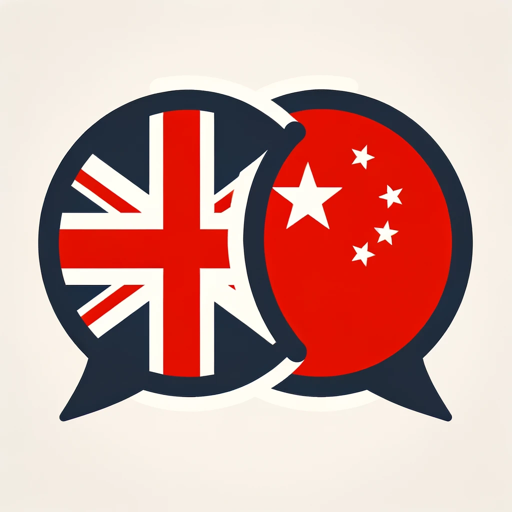Chinese-Chinese language AI assistant
AI-powered Chinese assistance for all
Related Tools
Load More
Chinese 智译
无需说明,自动在中文和其他语言间互译,支持翻译代码注释、文言文、文档文件以及图片。No need for explanations, automatically translate between Chinese and other languages, support translation of code comments, classical Chinese, document files, and images.

Chinese Translator
Bilingual English/Chinese translator with Pinyin support. Visit https://translate.mom for video translations! Created by https://x.com/montakaoh

Mr Traditional Chinese (for English Speakers) 🐉
Your guide to make learning Chinese words easy & memorable.

Chinese Teacher
Let's practice conversing in Chinese!
In Traditional Chinese
Response in Traditional Chinese Only

Chinese-English Lingua Bridge
Translator for English-Chinese, now with sci-article paragraphs.
20.0 / 5 (200 votes)
Overview of Chinese Language Services
Chinese language services, in this context, refer to a range of digital tools and platforms designed to support language learning, communication, translation, and cultural understanding. The design purpose behind these services is to facilitate both native and non-native speakers in mastering the Chinese language, whether for professional, educational, or casual purposes. Examples include real-time translation software, language learning apps, and advanced AI tools that provide personalized language guidance. A primary function of such services is to break down language barriers, allowing users to seamlessly communicate with native speakers or consume Chinese media. For instance, a student studying Chinese history may use a language learning app to understand complex academic texts, while a business professional might use translation tools to negotiate with Chinese partners.

Key Functions of Chinese Language Services
Real-time Translation
Example
Using mobile apps like Google Translate or Microsoft Translator for instant translations.
Scenario
A traveler visiting China might use their phone to translate street signs or restaurant menus, ensuring they can navigate the environment with ease.
Language Learning Tools
Example
Apps like Duolingo or HelloChinese providing structured lessons on Chinese vocabulary and grammar.
Scenario
A university student preparing for a semester abroad in China could use these tools to learn basic conversational Chinese, practice pronunciation, and gain cultural insights.
Cultural Understanding and Immersion
Example
Platforms like YouTube or podcasts that feature native Chinese speakers discussing culture, politics, or daily life.
Scenario
A business executive preparing for meetings with Chinese partners might watch videos on Chinese business etiquette and cultural nuances to avoid misunderstandings and foster better relationships.
Target Users of Chinese Language Services
Language Learners
This group includes students, professionals, and hobbyists who are interested in learning Chinese for personal, academic, or professional purposes. They benefit from structured lessons, real-time feedback, and tools that help with pronunciation, vocabulary building, and cultural immersion.
International Business Professionals
Executives, managers, and entrepreneurs who regularly engage with Chinese-speaking markets or companies. They use Chinese services for translation, cultural understanding, and communication, benefiting from tools that help them navigate complex negotiations or build long-term business relationships in China.

How to Use Chinese Language AI
Step 1
Visit aichatonline.org for a free trial without login, and no need for ChatGPT Plus.
Step 2
Ensure your browser is updated and has stable internet access to optimize performance for real-time responses.
Step 3
Familiarize yourself with basic Chinese language usage or utilize tools like pinyin to input Chinese characters.
Step 4
Type your queries or texts in either Chinese or English, and let the AI assist with translations, explanations, or enhancements.
Step 5
Explore additional features like Chinese grammar corrections, writing enhancements, or cultural explanations for deeper understanding.
Try other advanced and practical GPTs
Chinese GPT
AI-powered tool for Chinese language tasks

Translator Chinese
Effortless AI-powered translations to Chinese

Chinese Coach
AI-powered Mandarin learning tool

Chinese Teacher
AI-powered Chinese conversation partner.

Chinese Translator
AI-powered English-Chinese Translation and Pinyin

Italian/English -English/Italian translator
AI-powered translations for all your needs.

Teach & Lead Pro
Empowering Educators with AI Solutions

Japanese Teacher
AI-powered Japanese learning tool.

Latin Teacher
AI-powered Latin translation and analysis

German Teacher
AI-powered German Grammar and Writing Assistant

Expert Teacher
Empowering learning through AI-driven insights

Natural Spanish Translator Latin America
AI-powered translations made easy

- Learning
- Business
- Writing
- Translation
- Culture
Common Questions About Using Chinese AI
How can I improve my Chinese writing using AI?
You can input your Chinese text, and the AI will provide grammar corrections, better word choices, and stylistic improvements, ensuring your writing sounds natural and polished.
Can I use this AI for translating English to Chinese?
Yes, the AI is capable of translating from English to Chinese and vice versa. It ensures the translations are contextually accurate, which is particularly useful for idiomatic expressions.
Is the AI capable of understanding Chinese dialects?
The AI primarily focuses on Mandarin Chinese, but it can understand and interpret pinyin, which makes it versatile for various Chinese dialects to some extent.
What kind of Chinese language learning help can this AI provide?
The AI can help learners with pronunciation, grammar tips, vocabulary building, and cultural context, making it ideal for beginners and intermediate learners.
Is the Chinese AI suitable for professional use?
Absolutely. It can help with business communication, formal document translation, and even technical or academic writing, ensuring precise language that fits professional contexts.